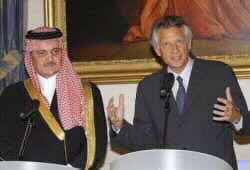Russia seems to be budging while France remains unmoved by arguments that time is running out for Iraq to disarm as the U.N. Security Council prepares for a crucial meeting on Wednesday. Following tough reports from weapons inspectors and President Bush's State of the Union address, the council seems to agree Baghdad needs to do more to cooperate with inspections. What the United States hopes to find out in Wednesday's meeting is whether that's enough to build international support for going to war to disarm Saddam Hussein .
"I'm still waiting for some instructions from Paris but don't count on a change," French Ambassador Jean-Marc de La Sabliere told The Associated Press ahead of the council meeting where countries are expected to lay out their positions.
The president announced Tuesday that on Feb. 5 Secretary of State Colin Powell will present the Security Council with "information and intelligence about Iraq's illegal weapons programs, its attempts to hide those weapons from inspectors, and its links to terrorist groups."
The president said the United States would consult with the council but if Saddam Hussein does not disarm, "we will lead a coalition to disarm him."
France, Russia and China, among the five veto-holding members of the council, have argued in favor of continued inspections and said they weren't ready to support a war at this stage.
But on Tuesday, a day after weapons inspectors delivered a largely negative report on Iraq's cooperation, Russia President Vladimir Putin warned that Moscow "may change its position" if Baghdad doesn't comply.
On Wednesday, Russian Foreign Ministry spokesman Alexander Yakovenko said: "We do not always assess specific sources of threats identically, but we regard Russian-American cooperation as an imperative in the resolution of common tasks of the provision of security and stability in the world."
Without signaling a shift in its position, France on Wednesday welcomed Bush's pledge to present more detailed evidence that Iraq is harboring mass destruction weapons and has links to terrorists.
"I'm delighted by this American decision," said Foreign Minister Dominique de Villepin.
In November, the United States managed to unite an often divided council behind a tough Security Council resolution giving inspectors broader authority to hunt for weapons of mass destruction. But under the terms of the resolution, inspectors weren't burdened with having to prove Iraq is rearming.
Instead, Iraq was warned up front of "serious consequences" should it fail to cooperate with inspectors and provide them with a complete picture of the country's weapons programs.
So far, chief weapons inspectors Hans Blix and Mohamed ElBaradei have reported that cooperation isn't what it should be and that Iraq's arms declaration is lacking.
For the Bush administration, that means time is running out. In his State of the Union address, the president said Iraqi officials were spying on inspectors, had removed evidence from suspected weapons sites before inspectors were able to reach them, and were posing as Iraqi scientists wanted for interviews by inspectors.
But inspectors say they can make a difference and prevent war if they're allowed to continue their work.
Blix, head of the U.N. Monitoring, Verification and Inspections Commission told The Associated Press the key would be "a changed attitude on the part of the Iraqis."
ElBaradei, head of the International Atomic Energy Agency charged with verifying Iraq's nuclear program, said he was asking for more time "on the assumption that Iraq will hear the message and come forward with evidence so we can move forward." His spokeswoman, Melissa Fleming said "three or four months would be realistic provided we get proactive cooperation from the Iraqis."
Both Blix and ElBaradei will participate in Wednesday's council meeting, to be held behind closed-doors, and are expected to answer questions council members posed after hearing their reports.
Their responses on a range of issues could further influence support for war or continued inspections.
"There are a handful of mostly technical questions, some on missiles," said Ewen Buchanan, spokesman for Blix's inspections team, which leads the hunt for biological, chemical and missile programs.
In a toughly worded assessment of Baghdad's cooperation with 60 days of inspections, Blix told the council Monday: "Iraq appears not to have come to a genuine acceptance, not even today, of the disarmament that was demanded of it."
ElBaradei was gentler and said nuclear inspectors had found "no evidence that Iraq has revived its nuclear program."
PHOTO CAPTION
French Foreign Minister Dominique de Villepin, right, and his Saudi counterpart Saud al Faisal hold a joint news conference in Paris Tuesday Jan. 28, 2003, after their meeting to discuss the Iraqi crisis. (AP Photo/Jacques Brino
- Author:
AP - Section:
WORLD HEADLINES


 Home
Home Discover Islam
Discover Islam Quran Recitations
Quran Recitations Lectures
Lectures
 Fatwa
Fatwa Articles
Articles Fiqh
Fiqh E-Books
E-Books Boys & Girls
Boys & Girls  Women
Women










